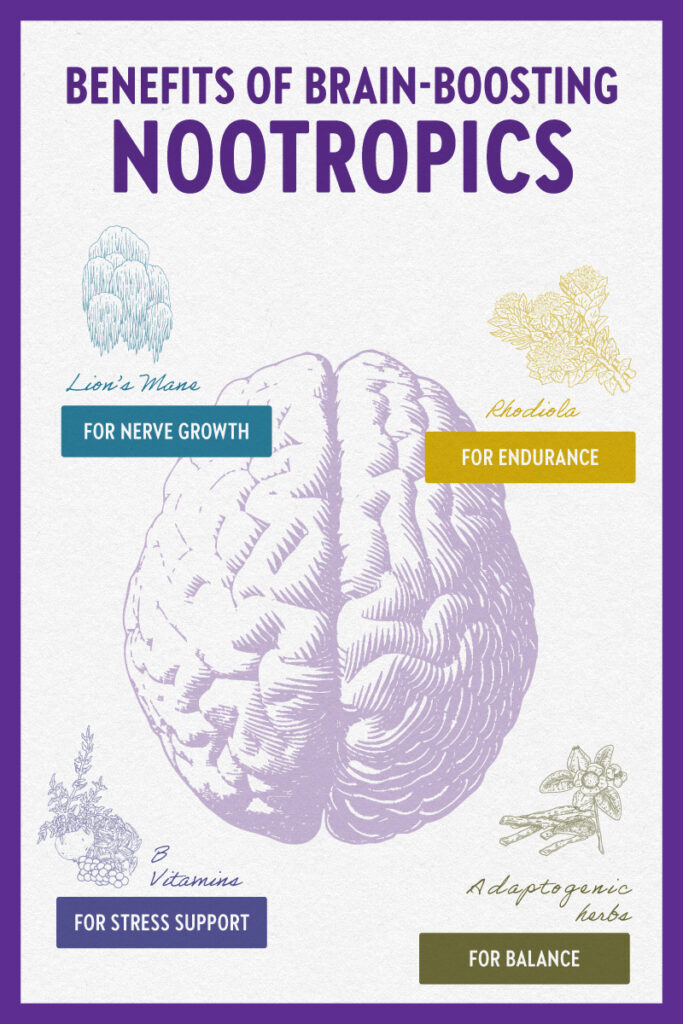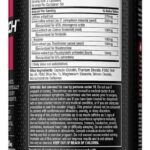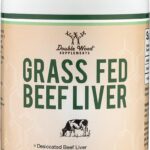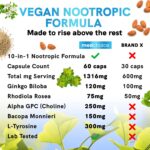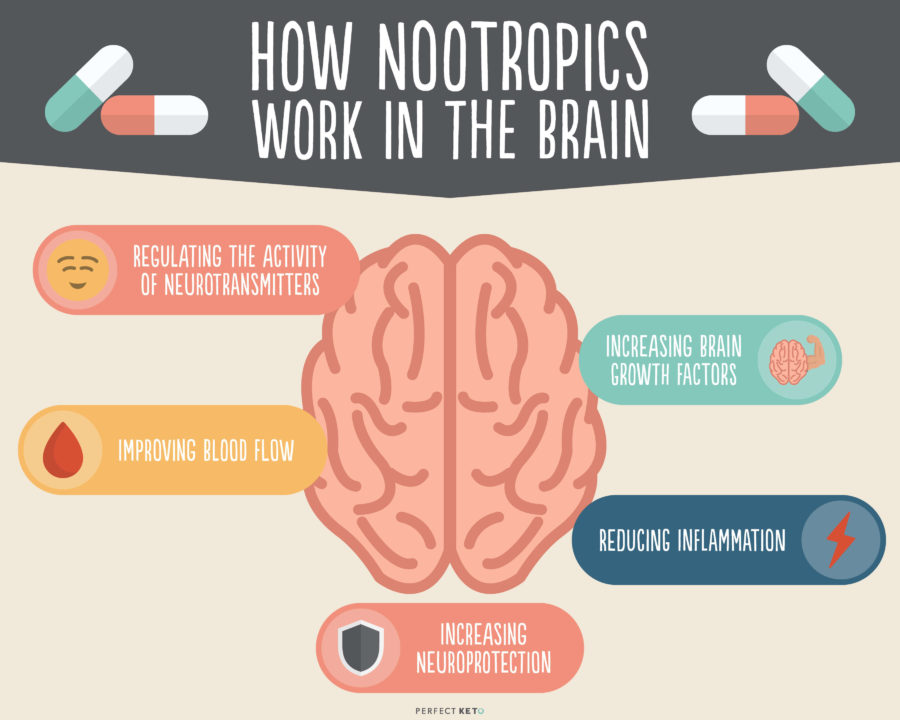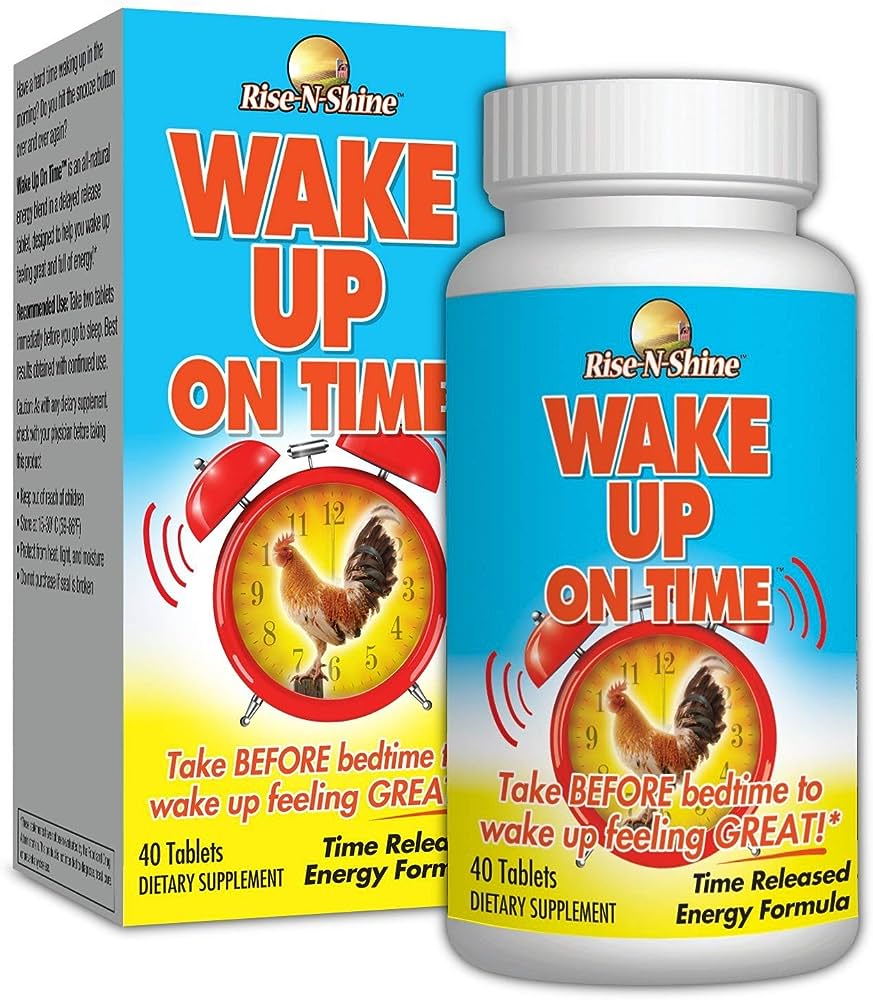So, have you ever heard about nootropics? They’re buzzing in the health and wellness world lately. You might be wondering, “What on earth are nootropics?” Well, let me break it down for you. Nootropics, also known as smart drugs or cognitive enhancers, are substances that are believed to improve cognitive function, memory, creativity, motivation, and overall brain health. Sounds interesting, right?
Let’s dive a bit deeper. Nootropics can be classified into two categories: natural and synthetic. Natural nootropics are derived from herbal extracts, vitamins, and minerals. You may have heard of popular natural nootropics like ginkgo biloba or fish oil. On the other hand, synthetic nootropics are compounds that are created in a lab and are often used to treat medical conditions like ADHD or Alzheimer’s disease.
In the upcoming article, we will explore the various types of nootropics, their potential benefits, and how they work in the brain. We will also discuss the importance of consulting with a healthcare professional before incorporating any new supplements into your routine. So, if you’re curious to learn more about this fascinating topic or considering giving nootropics a try, stay tuned for the full article!
Definition of Nootropics
The origin and meaning of the term ‘nootropics’
The term “nootropics” was first coined in 1972 by the Romanian psychologist and chemist Dr. Corneliu E. Giurgea. Derived from the Greek words “nous” meaning “mind” and “trepein” meaning “to turn,” nootropics can be defined as substances that enhance cognitive function and improve brain health. These compounds are known for their ability to enhance memory, concentration, creativity, and overall brain performance.
Nootropics as substances that enhance cognitive function
Nootropics are often referred to as “smart drugs” or “cognitive enhancers” due to their ability to improve various aspects of cognitive function. These substances work by targeting neurotransmitters, receptors, and other components of the brain, influencing their activity to promote cognitive enhancement. Nootropics can provide a range of benefits, such as improved focus and concentration, enhanced memory and learning abilities, increased mental energy and motivation, and reduced anxiety and stress levels.
Types of Nootropics
Natural nootropics derived from plants
Some of the most well-known natural nootropics are derived from plants and have been used for centuries in traditional medicine. Examples include Ginkgo Biloba, Bacopa Monnieri, and Rhodiola Rosea. These plants contain bioactive compounds that can boost cognitive function, improve memory, reduce stress, and enhance overall brain health.
Synthetic compounds designed to improve brain function
Synthetic nootropics are manufactured compounds that are specifically designed to enhance brain function. Examples include Piracetam, Aniracetam, and Phenylpiracetam. These synthetic compounds are often used to improve cognitive abilities, increase attention span, and enhance memory and learning capacity.
Pharmaceutical drugs used as nootropic agents
Certain pharmaceutical drugs have also been repurposed as nootropics due to their ability to enhance cognitive function. Modafinil, originally developed to treat sleep disorders such as narcolepsy, is often used off-label as a cognitive enhancer to increase wakefulness, mental energy, and productivity.
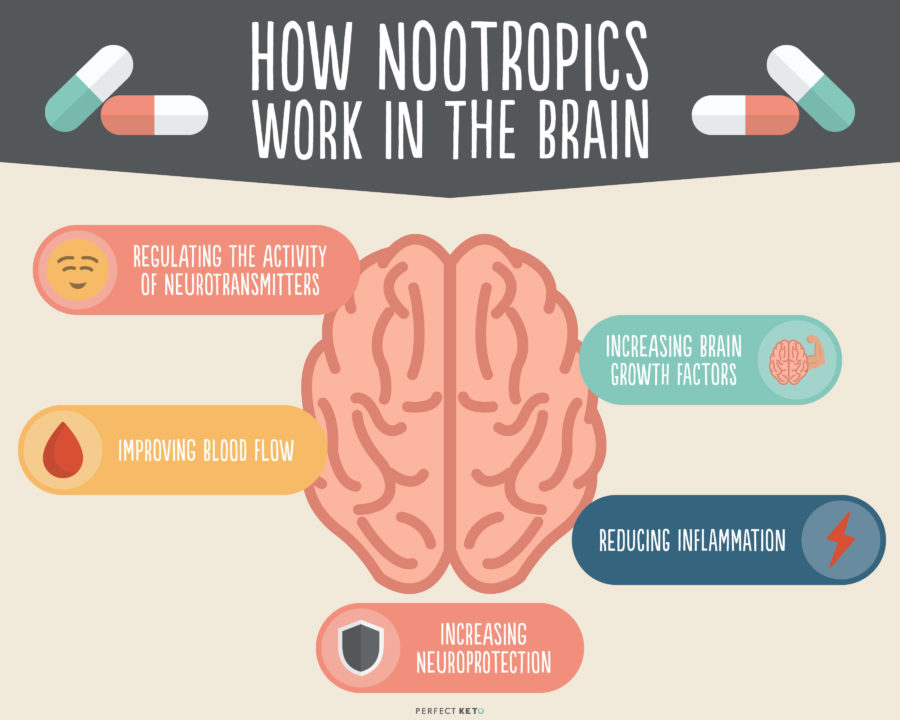
Mechanisms of Action
How nootropics interact with brain chemistry
Nootropics interact with various components of the brain’s chemistry, influencing neurotransmitters, receptors, enzymes, and other molecular targets. These interactions can enhance cognitive function by promoting optimal brain activity and communication.
Effects on neurotransmitters and receptor sites
Many nootropics work by modulating neurotransmitter levels in the brain. Neurotransmitters such as dopamine, acetylcholine, serotonin, and glutamate play crucial roles in cognition, mood, memory, and other brain functions. Nootropics can increase the release, uptake, or synthesis of these neurotransmitters, resulting in improved cognitive abilities.
Enhancement of cerebral blood flow and oxygenation
Some nootropics also improve cerebral blood flow and increase oxygenation in the brain. By enhancing blood flow, these substances ensure that the brain receives an adequate supply of nutrients and oxygen, thereby promoting optimal cognitive function.
Popular Nootropic Substances
Caffeine and its cognitive benefits
One of the most widely consumed nootropic substances is caffeine. Found in coffee, tea, and certain energy drinks, caffeine is known for its ability to increase alertness, focus, and mental energy. Caffeine works by blocking adenosine receptors in the brain, which leads to increased dopamine and adrenaline production.
L-theanine and its synergistic effects with caffeine
L-theanine, an amino acid found in tea leaves, is often combined with caffeine due to its synergistic effects. While caffeine can sometimes cause jitters and anxiety, L-theanine helps to promote a sense of relaxation and calmness. The combination of caffeine and L-theanine results in improved attention, focus, and cognitive performance without the usual side effects of caffeine alone.
Lion’s Mane mushroom and its neuroprotective properties
Lion’s Mane mushroom (Hericium erinaceus) is a natural nootropic that has gained popularity for its neuroprotective and cognitive-enhancing properties. This mushroom contains compounds that stimulate the production of nerve growth factors in the brain, promoting brain cell regeneration and improving cognitive function. Lion’s Mane is believed to enhance memory, focus, and overall brain health.
Modafinil as a prescription nootropic for increased wakefulness
Modafinil is a prescription nootropic often used to treat sleep disorders such as narcolepsy and sleep apnea. It is also used off-label as a cognitive enhancer by individuals seeking increased wakefulness, focus, and productivity. Modafinil works by stimulating certain neurotransmitters in the brain, promoting wakefulness while reducing fatigue and drowsiness.
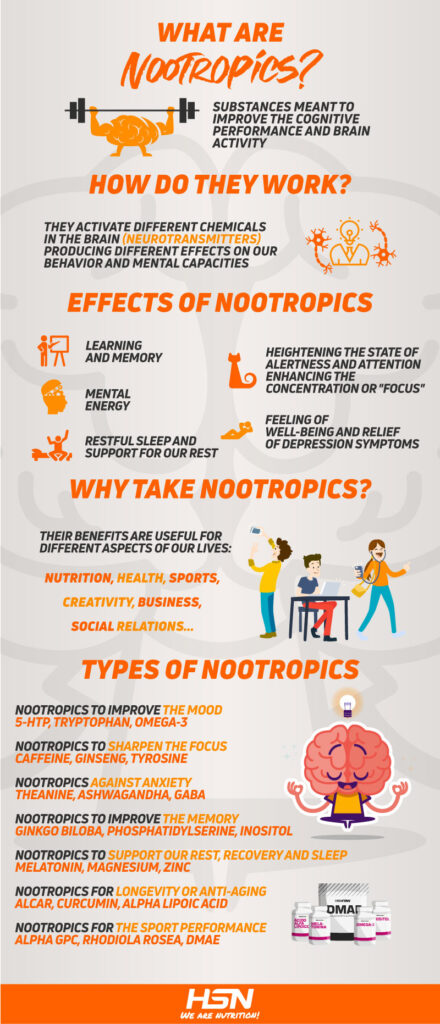
Benefits of Nootropics
Improved focus and concentration
One of the primary benefits of using nootropics is improved focus and concentration. Nootropics can help enhance attention span and reduce distractions, allowing individuals to stay focused on tasks for longer periods of time.
Enhanced memory and learning abilities
Nootropics can also improve memory and learning abilities by enhancing the brain’s ability to store and retrieve information. These substances can promote neuroplasticity, the brain’s ability to form new neural connections, which is crucial for memory formation and learning.
Increased mental energy and motivation
Many nootropics provide a boost in mental energy and motivation, allowing individuals to stay mentally alert and motivated throughout the day. These substances can help combat mental fatigue and increase productivity.
Reduced anxiety and stress levels
Certain nootropics have anxiolytic properties, meaning they can reduce anxiety and stress levels. By promoting relaxation and calmness, these substances can help individuals stay focused and perform better in stressful situations.
Potential Risks and Side Effects
Allergic reactions and sensitivities
As with any substances, some individuals may experience allergic reactions or sensitivities to certain nootropics. It is important to be aware of any potential allergies by starting with low doses and monitoring for adverse effects.
Interactions with other medications
Nootropics, especially pharmaceutical drugs, may interact with other medications. It is essential to consult with a healthcare professional before starting any nootropic regimen to ensure there are no harmful interactions.
Dependency and withdrawal symptoms
Some nootropics have the potential for dependency and may cause withdrawal symptoms when discontinued abruptly. It is important to use these substances responsibly and consult with a healthcare professional if concerns arise.
Long-term effects on brain health
While many nootropics are generally safe for short-term use, the long-term effects of their usage are not yet fully understood. It is crucial to use nootropics responsibly and in moderation to avoid any potential long-term risks to brain health.
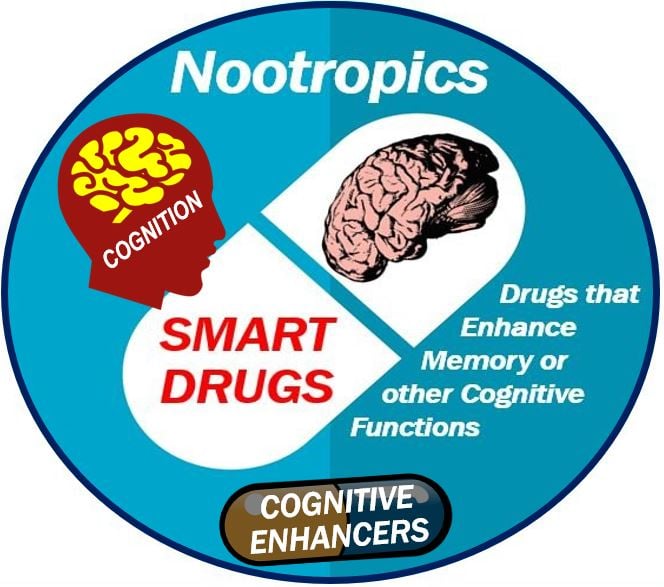
Choosing the Right Nootropic
Understanding individual goals and needs
When choosing a nootropic, it is important to understand individual goals and needs. Are you looking to enhance focus, memory, or overall brain health? Understanding your specific objectives can help narrow down the options.
Researching and evaluating different options
With a wide range of nootropic substances available, it is important to research and evaluate different options before making a decision. Understanding the mechanisms of action, potential side effects, and user experiences can help make an informed choice.
Consulting with healthcare professionals
Before starting any nootropic regimen, it is advisable to consult with a healthcare professional. They can provide personalized advice, ensure there are no contraindications with existing medical conditions or medications, and help determine the right dosage and administration protocol.
Proper Dosage and Administration
Recommended dosages for different nootropics
Each nootropic has its own recommended dosage range. It is essential to follow the guidelines provided and start with the lowest effective dose. Gradually increasing the dosage, if necessary, can help assess individual tolerance and response.
Timing and frequency of administration
The timing and frequency of administration can also impact the effectiveness of nootropics. Some substances may be best taken in the morning to enhance wakefulness and mental energy, while others may be more suitable for improved sleep quality if taken in the evening.
Stacking and combining nootropic substances
Stacking involves combining different nootropic substances to achieve synergistic effects. This approach may enhance the overall cognitive benefits but should be done cautiously. It is important to research and understand the potential interactions between different substances before experimenting with stacking.
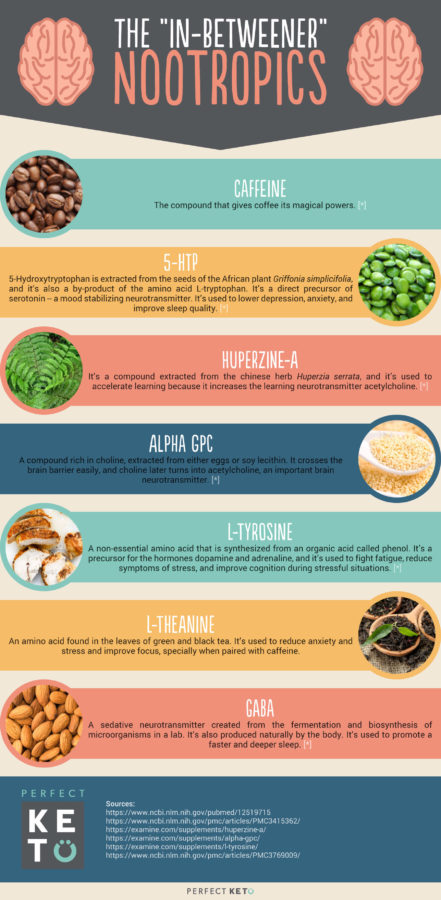
Nootropics and Lifestyle Factors
Supporting cognitive enhancement with healthy habits
While nootropics can enhance cognitive function, they should not replace the importance of a healthy lifestyle. Maintaining a balanced diet, regular exercise, and adequate sleep are crucial factors that support optimal brain function.
Optimizing nutrition and hydration
Proper nutrition is essential for the brain to function at its best. Consuming a diet rich in fruits, vegetables, whole grains, and healthy fats can provide the necessary nutrients for optimal brain health. Staying hydrated is also important as dehydration can impair cognitive abilities.
Exercise and its impact on brain function
Regular exercise has been shown to improve cognitive function and brain health. Engaging in physical activity increases blood flow, promotes the release of neurotransmitters, and stimulates the growth of new brain cells, all of which contribute to improved cognitive abilities.
Quality sleep and its effects on cognitive abilities
Adequate sleep is crucial for optimal brain function. During sleep, the brain processes information, consolidates memories, and repairs itself. Lack of sleep can impair cognitive abilities, memory, and overall brain health. Prioritizing quality sleep is essential for cognitive enhancement.
Conclusion
The growing popularity of nootropics reflects the desire for enhanced brain function and cognitive performance. While these substances can provide a range of benefits, it is essential to use them responsibly and in consultation with healthcare professionals. Understanding individual goals, researching different nootropic options, and considering lifestyle factors are key to maximizing the potential benefits of nootropics while minimizing potential risks. By adopting a balanced approach and making informed decisions, you can responsibly harness the potential of nootropics for cognitive improvement.
